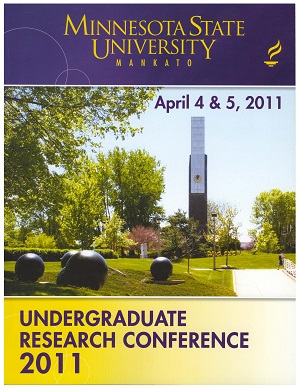Violence Exposure, Self-Esteem and Alcohol Consumption in Adolescents
Location
CSU 201
Start Date
4-4-2011 11:00 AM
End Date
4-4-2011 12:30 PM
Student's Major
Psychology
Student's College
Social and Behavioral Sciences
Mentor's Name
Sarah Sifers
Mentor's Department
Psychology
Mentor's College
Social and Behavioral Sciences
Description
This study examined exposure to violence, self-esteem and alcohol consumption in young adolescents. Two hundred sixth and ninth graders in the public schools of a Midwestern small metropolitan area completed the Search Institute Profiles of Student Life: Attitudes and Behaviors in their first period class. Being a victim/witnesses of violence was associated with more alcohol consumption. Self-esteem did not predict alcohol use nor did it interact with violence exposure in predicting alcohol use. Students participating in violence reported more alcohol use. Self-esteem interacted with participating in violence such that higher self-esteem increased the likelihood of alcohol use among youth participating in violence. It is logical both being a victim/witness of violence and participating in violence are risk factors for alcohol use. However, it appears that high self-esteem does not protect against alcohol consumption among youth who are victims/witness of violence, and in fact is a risk factor in adolescents who participate in violence. This suggests that intervening to reduce exposure to violence (as a victim/witness and perpetrator) may be helpful in reducing risk of alcohol use in young adolescents.
Violence Exposure, Self-Esteem and Alcohol Consumption in Adolescents
CSU 201
This study examined exposure to violence, self-esteem and alcohol consumption in young adolescents. Two hundred sixth and ninth graders in the public schools of a Midwestern small metropolitan area completed the Search Institute Profiles of Student Life: Attitudes and Behaviors in their first period class. Being a victim/witnesses of violence was associated with more alcohol consumption. Self-esteem did not predict alcohol use nor did it interact with violence exposure in predicting alcohol use. Students participating in violence reported more alcohol use. Self-esteem interacted with participating in violence such that higher self-esteem increased the likelihood of alcohol use among youth participating in violence. It is logical both being a victim/witness of violence and participating in violence are risk factors for alcohol use. However, it appears that high self-esteem does not protect against alcohol consumption among youth who are victims/witness of violence, and in fact is a risk factor in adolescents who participate in violence. This suggests that intervening to reduce exposure to violence (as a victim/witness and perpetrator) may be helpful in reducing risk of alcohol use in young adolescents.
Recommended Citation
Neubert, Leah. "Violence Exposure, Self-Esteem and Alcohol Consumption in Adolescents." Undergraduate Research Symposium, Mankato, MN, April 4, 2011.
https://cornerstone.lib.mnsu.edu/urs/2011/oral-session-04/3




